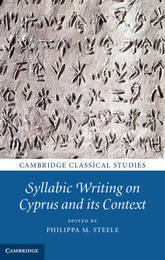
|
Syllabic Writing on Cyprus and its Context
Hardback
Main Details
| Title |
Syllabic Writing on Cyprus and its Context
|
| Authors and Contributors |
Edited by Philippa M. Steele
|
| Series | Cambridge Classical Studies |
|---|
| Physical Properties |
| Format:Hardback | | Pages:208 | | Dimensions(mm): Height 223,Width 144 |
|
| ISBN/Barcode |
9781107026711
|
| Classifications | Dewey:411.7095693 |
|---|
| Audience | | Professional & Vocational | |
|---|
| Illustrations |
7 Tables, black and white; 5 Halftones, black and white; 8 Line drawings, black and white
|
|
Publishing Details |
| Publisher |
Cambridge University Press
|
| Imprint |
Cambridge University Press
|
| Publication Date |
28 March 2013 |
| Publication Country |
United Kingdom
|
Description
This volume offers a new and interdisciplinary treatment of syllabic writing in ancient Cyprus. A team of distinguished scholars tackles epigraphic, palaeographic, linguistic, archaeological, historical and terminological problems relating to the island's writing systems in the Late Bronze Age and Iron Age, from the appearance of writing around the fifteenth century down to the end of the first millennium BC. The result is not intended to be a single, unified view of the scripts and their context, but rather a varied collection that demonstrates a range of interpretations of the evidence and challenges some of the longstanding or traditional views of the population of ancient Cyprus and its epigraphic habits. This is the first comprehensive account of the 'Cypro-Minoan' and 'Cypriot syllabic' scripts to appear in a single volume and forms an invaluable resource for anyone studying Cypriot epigraphy or archaeology.
Author Biography
Philippa M. Steele is a British Academy Postdoctoral Fellow based in the Faculty of Classics, Cambridge, and a Fellow of Magdalene College and Director of Studies in Classics at Wolfson College. In 2013-14, she gave the annual Evans-Pritchard Lectures at All Souls College, Oxford, on the theme of 'Society and Writing in Ancient Cyprus'. Her monograph A Linguistic History of Ancient Cyprus (Cambridge, 2013) is a publication of her doctoral research, which won the University of Cambridge's prestigious Hare Prize.
|